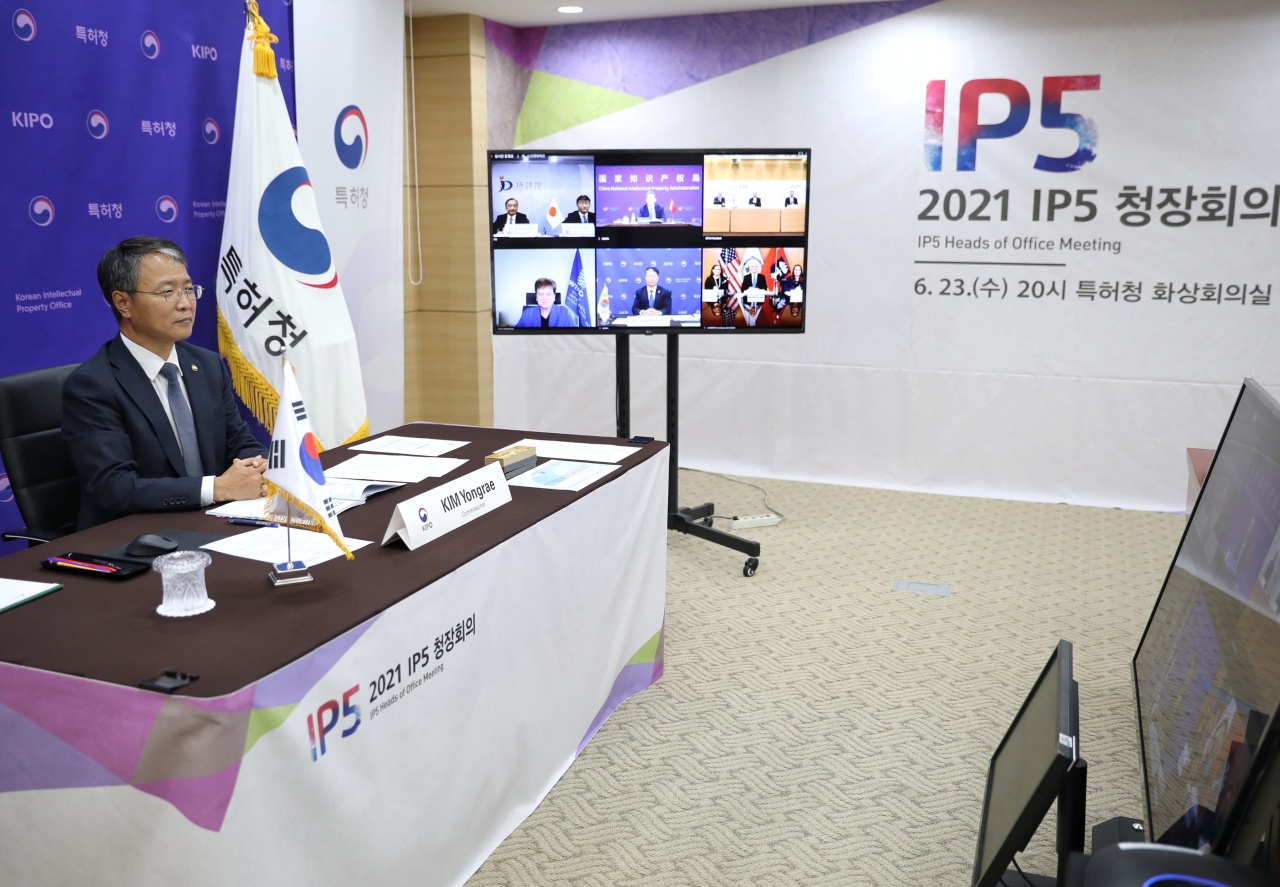As the grueling seven-year patent war between Samsung and Apple through 2018 showed, intellectual property rights can be used as spears and shields in the global fight for technological hegemony.
Amid an intensifying patent war and the COVID-19 pandemic, applications for intellectual property rights in South Korea rose 12.3 percent from a year ago to 284,135 cases in the first half of this year, and the figure is expected to break 600,000 this year.
To keep the spirt of innovation alive, the Korea Intellectual Property Office should step up to foster and protect intellectual properties, said Commissioner Kim Yong-rae, in an interview with The Korea Herald.
“The ultimate mission of our agency is to create a virtuous circle of innovation across the IP creation, protection and utilization, contributing to local companies’ competitiveness,” said Kim, who took office in September last year.
Under his stewardship, the state IP agency is therefore expanding international cooperation to better examine patent applications and enhance digitization; bolstering support for small businesses in patent disputes overseas; and seeking to improve protection of intellectual property rights, the commissioner said.
Through multilateral cooperation at the Intellectual Property Five (IP5), the World Intellectual Property Organization (WIPO), a trilateral forum with China and Japan, and the Association of Southeast Asian Nations (ASEAN), the KIPO has sought to improve the intellectual property system and harmonize the systems of different countries.
Through bilateral cooperation with some 40 countries, the South Korean patent office implemented the Patent Prosecution Highway (PPH) that allows fast track examination of patent applications if another country has issued a patent for the same invention, and the Collaborative Search Program under which examiners in two different countries can share what they have looked at so far on patent applications made in both countries.
With the emergence of new technologies such as artificial intelligence, blockchain and metaverse, the scope of international cooperation on intellectual property is widening, the commissioner said.
The KIPO has led a task force within the IP5 on new emerging technologies and artificial intelligence since 2019, which came up with a road map for cooperation in June to protect AI inventions and make use of new technologies in examinations.
The KIPO is also in working-level talks with the UK and Canada, which aren’t part of the IP5, to share examination policies on AI inventions and harmonize examination practices.
Since 2007, the KIPO has been a member of the IP5, a forum of the five largest intellectual property offices in the world, including those of the US, Europe, Japan and China.
Patent applications made to the five patent offices accounted for about 85 percent of the world’s total in 2019.
More than 350,000 patent applications were made to two or more of the five intellectual property offices in 2016, which means they can spend less time on patent examinations through close cooperation.
In addition to achieving its initial goal of quickly handling a backlog of unexamined patent applications, the IP5 established a system to share patent information, and is seeking to make the global intellectual property system more convenient and efficient.
The KIPO also supports Korean small and medium-sized businesses involved in patent lawsuits overseas, which can go on for years and cost billions of won.
By setting up 15 IP-DESKs in nine countries including two in the US and six in China, the KIPO strengthened monitoring of SMEs’ patent disputes abroad and helps them build strategies to tackle the disputes.
To prevent patent disputes in advance, the KIPO expanded support for IP-R&D, a research and development strategy linked to intellectual property rights, from 232 tasks in 2018 and 246 in 2019 to 505 last year.
The KIPO also issues intellectual property vouchers that can be used to get patent analysis services and loans for patent lawsuits.
To better protect intellectual property rights, the KIPO recently expanded the role of its special judicial police group that previously focused on trademarks to investigations on patents, trademarks and designs.
Based on their technological and legal expertise acquired through experience in KIPO’s examinations and trials, these “tech police” specialize in investigations on patents and trade secrets that are difficult for regular police to handle.
Kim said the tech police recently prevented a core technological leak from a semiconductor production facility company by investigating attempts to steal its trade secrets.
“With a fair and swift action, we will respond preemptively to any potential technology leaks in key strategic industrial fields and protect the intellectual properties of our companies,” Kim stressed.
What was formerly an intellectual property investigation division, consisting of 47 personnel to investigate illegal activities related to trademarks, patents and unfair competition, has been reorganized into three specialized divisions with a total of 58 personnel.
The KIPO first established a special judiciary police on trademarks in 2010 to enhance law enforcement on counterfeits, with offices in Seoul, Busan and Daejeon.
Since then, they have processed some 53,000 reported cases, booked about 4,000 individual suspects on criminal charges and confiscated 12 million pieces of counterfeit products.
As the global competition for technological hegemony intensifies, especially in the fields of artificial intelligence and semiconductors, the KIPO is taking steps to establish a patent data system to help local businesses get ahead of future technological trends by looking into ongoing developments around the world.
It expects the data system to allow businesses to analyze the latest trends in patents across different industries, and thus enhance their technological competence.
By Kim So-hyun (
sophie@heraldcorp.com)








![[Today’s K-pop] Blackpink’s Jennie, Lisa invited to Coachella as solo acts](http://res.heraldm.com/phpwas/restmb_idxmake.php?idx=644&simg=/content/image/2024/11/21/20241121050099_0.jpg)